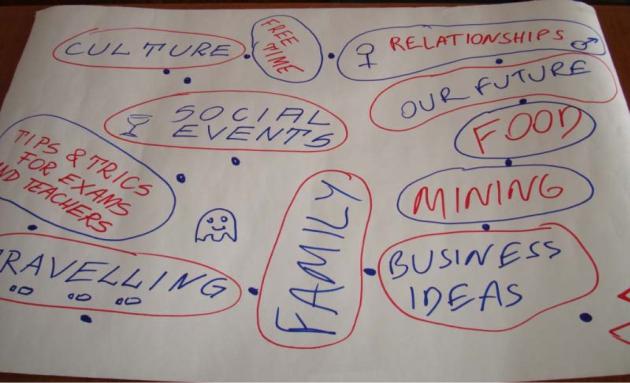
ENGLISH for Study and Work том 1
.pdfUnit 6 Exchanging Information and Discussing News
Focus on
•participating in routine informal discussions and meetings on profession related topics
•expressing own ideas and opinions
•highlighting the personal significance of the events and experiences in personal and academic life
•giving opinions on content of authentic radio and TV programmes
•reading and identifying writer’s attitudes and viewpoints in authentic texts related to academic and/or professional area
•reading instructions
•passing on detailed information
By the end of the unit you will:
•be able to participate in informal discussions expressing your own opinions and ideas on various topics related to your personal and academic life
•be able to deliver and pass the information
•be able to offer opinions on content of authentic mass media sources
•understand how core values and beliefs of Ukrainian students differ from culture to culture (regional, national, international)
•develop your own strategy to participate in discussions
Lead - in
1. Group-work. Being in groups of three or four, brainstorm the typical issues students of Ukraine discuss. Put your ideas on a sheet of paper. Be ready to present your ideas to the whole group. Make a poster of the ideas of the whole group.
6059

2. Below is the mind-map of the burning issues discussed by foreign students that was made by the participants of the International Students’ Forum. Look and compare it with your posters. Be ready to answer the following questions:
•What topics are common for all of the posters?
•What do you agree with? Explain why.
•What do you disagree with? Why? Give your arguments.
•Is there anything you would like to change in the mind-map?
•Is there anything you would like to add to your mind-map?
Fig. 1. Mind-map of the burning issues discussed by the Polish students
3. Make any changes in your mind-map if necessary.
Reading, Speaking and Making notes
4. Below are some phrases typically used in discussions for developing an argument.
610
4.1.Find:
•four structures used for expressing your own opinions
•three structures used for focusing someone’s attention on information
•three structures used for clarifying
•three structures for making a conclusion
•one word used for emphasizing.
A.Taking all this into consideration _____.
B.In my opinion/view ______.
C.The thing/matter is ______.
D.In particular, _______.
E.I am convinced that ______.
F.As far as I know _______.
G.It seems to me that ______.
H.The majority of students/ teachers/ people_______.
I.The thing that impressed me most was _______.
J.The one thing that worries me ______.
K.All things considered _______.
L.Mainly ______.
M.Predominantly ______.
N.By _____, do you mean ______?
O.Could you explain what you mean by _____?
P.Are you sure (that ______)?
Q.To sum up, ______.
621

4.2. Pair-work. Compare the results of your work with a partner. Put the corresponding letters into the table opposite appropriate Function.
Function |
Words and structures |
|
|
Expressing own opinions |
B, |
|
|
Focusing attention |
|
|
|
Clarifying |
|
|
|
Emphasizing |
|
|
|
Concluding |
|
|
|
5. Group-work. Being in groups, make a mind-map on the sources where you can find news and information. Compare the results of your work with another group. Find out what is common and different in your mind maps. If necessary ask for clarification and give your arguments.
Sources of
News and
Information
632

6. Read an article from American on-line Students Newspaper accessed on http:// www. psu.edu/archive/2008/05/05 and see if you can locate any main and supporting ideas. Make a note of this.
Thursday, June 5, 2008
Posted on May 5, 2008 12:51 AM
Sleep needs more respect
By Kelly Anthony
Kelly Anthony is a freshman majoring in journalism and nutrition and is a Daily Collegian page designer.
Her e-mail address is kwa5031@psu.edu.
It has sadly come to my attention that we college students, a far cry from the mat-bearing kindergartners we once were, are no longer giving sleep the respect it deserves.
It's decidedly trendy for undergrads to survive on a Spartan four hours and to wear all-nighters spent studying like a badge.
Lethargy is unbecoming, but the greatest injustice lies here: We are shunning the basic (and necessary) human function that is sleep. And I, as an aficionado of sorts, would like to rectify that. Aside from Guitar Hero and excessive alcohol consumption, we seem to have three main priorities: to earn a golden GPA, to be attractive and desirable and to land a good-looking member of the opposite sex. Not one of these goals is achievable without adequate sleep.
A study conducted at the University of Pennsylvania found that by missing out on only two of the necessary nine hours of sleep, you've already made making the Dean's list that much more improbable. That means impaired learning, greater vulnerability to stress and an inability to carry out complex tasks.
After a night without sleep, students did 40 percent worse memorizing lists of words than they had on nights with adequate sleep -- that's four letter grades. So, pull an all-nighter if you must, but there goes that stellar GPA. And that scratches off priority No. 1.
643
Which leads us to priority two -- the need to look hot. Our genetic hardwiring has made sure that everything we do is because of our inherent longing for desirability -- cologne, fashion and cardio routines included.
According to a 60 Minutes report, missing sleep leads to weight gain, negative self-image and stress, which has side effects such as the skin conditions Rosacea and acne. Sleep-deprived test subjects also show an eyebrow-raising deficit of the hormone Leptin, which we need to signal the brain to stop eating, 60 Minutes reported. This increase in hunger may be a factor in the national obesity epidemic.
Other studies show that dreams are an integral part in positive self-image and self-identity development. If that isn't enough, the sleep-deprived also show irrationality and moodiness. Chubby, more annoying and less self-secure? Say bye-bye to priority two.
Squashing any possibility of priority two has simultaneously destroyed any minute possibility of priority three ever happening -- getting with an attractive member of the opposite sex. Even if, in your despondent and butterball state, you were to by chance hook an attractive one, science has made it decidedly harder to reel them in.
Sleep deprivation causes excess strain on the mind and body, including your sex drive. One-fourth of respondents in a recent CBS survey reported that a sexual relationship of theirs had been hurt because their partner had been too sleepy.
Getting less sleep also causes testosterone levels to plummet, resulting in erectile dysfunction, according to a 60 Minutes interview with Jon Pryor, a professor of urologic surgery at the University of Minnesota.
So, you'll be getting less, and might even be too tired to care. Scared yet?
We've sentenced ourselves to what multiple studies say are problems in social relationships, difficulty handling stress, anxiety, depression and trouble with school -- issues that we already struggle with.
____________________________________________________________________
*Collegian Inc., 123 S. Burrowes St., University Park, Pa.
Accessed at http:// www. psu.edu/archive/2008/05/05 [online].
654
7. Pair-work. Look through the article again and exchange your opinion and ideas on:
•Was this article of any interest to you? Why?
•Do Ukrainian students have the similar problems with sleep?
•What was new for you in this article?
•Did it make you think on your life style? If yes, why?
•Would you like to discuss this article with your friends and groupmates?
While exchanging your ideas, use the phrases from 4. If necessary fill the gaps given in 4.1. with the appropriate information from the article.
Follow-up
8.Think of the following questions and be ready to share your ideas and opinions within the group:
•Is there a Students’ Newspaper in your university? If yes, is it published by students?
•What issues should be highlighted in a Students’ Newspaper? Why?
•Would you like to write an article to a Students’ Newspaper?
•If yes, see 9 below.
9.Write a short article to the university students’ newspaper on your impressions on the university as a fresher.
10.Watch TV news and be ready to discuss current events within your groupmates next class.
665
Unit 7 Dealing with Problems
Focus on:
•reading authentic texts related to study or specialism areas from Webbased sources
•understanding instructions
•developing strategies to participate in discussions and seminars
•accounting of different points of view
•comprehending different registers: how people talk and write to friends, colleagues, employers, and people of different ages and social status for different purposes
•developing understanding different corporate cultures within specific professional contexts and how they relate to each other
By the end of the unit you will:
•be able to participate appropriately in common social and academic settings
•be able to participate in clear argument on topical issue in academic and professional areas (e.g. seminars, discussions, debates, etc.)
•be able to deliver and pass the information
•be able to offer opinions on content of authentic mass media sources
•be able to deal with problems by writing letters of complaint
•understand how core values and beliefs of Ukrainian students differ from culture to culture (regional, national, international)
•develop your own strategy to participate in discussion
Lead-in
1. Group-work. Being in groups of three or four share your experience of the first two months being in the university focusing on the following questions:
67

•Have you faced any problems in your study, staying in a Residence Hall and/or while spending your free time? If yes, put them on a list.
•Are there any differences in the study in school and the university? If yes, put them on the list into two columns: school, university.
•If you are not a resident of Dnipropetrovsk, how do you find the city in comparison to your native town? Is it easy for you to live here?
•What are the main difficulties for you to adjust to university life and culture? Identify them and put them on the list.
2.Whole-group discussion. Share the results of your group-work with the whole group and identify the problems typical for the whole group.
Reading and Discussion
3. Below is the article from the site of the State University of New York at Buffalo. Read it and compare the typical problems listed with the ones you have faced. You may mark them in the text in any way suitable for you (underline, mark etc.)
Tips for Adjusting to University Life and Resources at the Counseling Services
For many first-year students, the University may be their first experience living away from home for an extended period of time. It is a definite break from home. The individual's usual sources of support are no longer present to facilitate adjustment to the unfamiliar environment. Here are tips for students which may provide realistic expectations concerning living arrangements and social life on campus. In addition, students may benefit from information concerning resources available to them at the Counseling Services office.
•The first few weeks on campus can be a lonely period. There may be concerns about forming friendships. When new students look around, it
687
may seem that everyone else is self-confident and socially successful. The reality is that everyone is having the same concerns.
•If they allow sufficient time, students usually find peers in the university to provide structure and a valuable support system in the new environment. The important thing for the student to remember in meeting new people is to be oneself.
•Meaningful, new relationships should not be expected to develop overnight. It took a great deal of time to develop intimacy in high school friendships; the same will be true of intimacy in university friendships.
•Increased personal freedom can feel both wonderful and frightening. Students can come and go as they choose with no one to "hassle" them. At the same time, things are no longer predictable. The strange environment with new kinds of procedures and new people can create the sense of being on an emotional roller-coaster. This is normal and to be expected.
•Living with roommates can present special, sometimes intense, problems. Negotiating respect of personal property, personal space, sleep, and relaxation needs can be a complex task. The complexity increases when roommates are of different ethnic/cultural backgrounds with very different values. Communicating one's legitimate needs calmly, listening with respect to a roommate's concerns, and being willing to compromise to meet each other's most important needs can promote resolution of issues.
•It is unrealistic to expect that roommates will be best friends. Roommates may work out mutually satisfying living arrangements, but the reality is that each may tend to have his or her own circle of friends.
•University classes are a great deal more difficult than high school classes. There are more reading assignments, and the exams and papers cover a greater amount of material. Instructors expect students to do more work outside the classroom. In order to survive, the student
698
